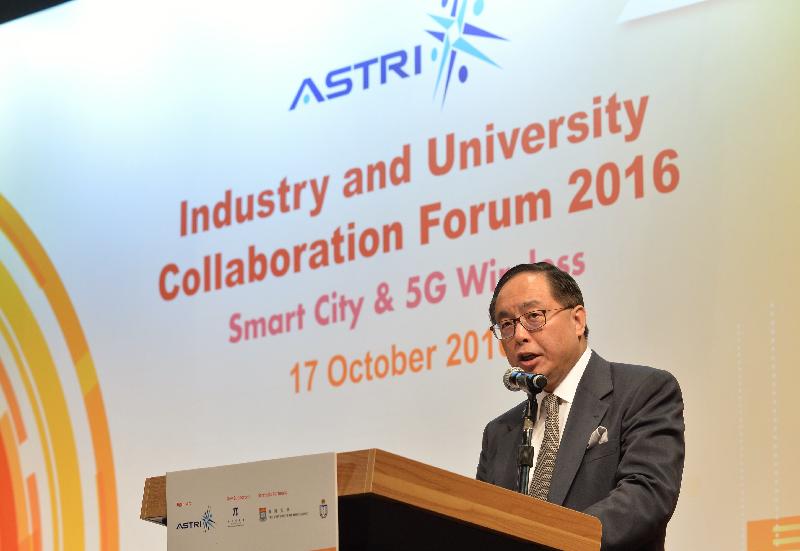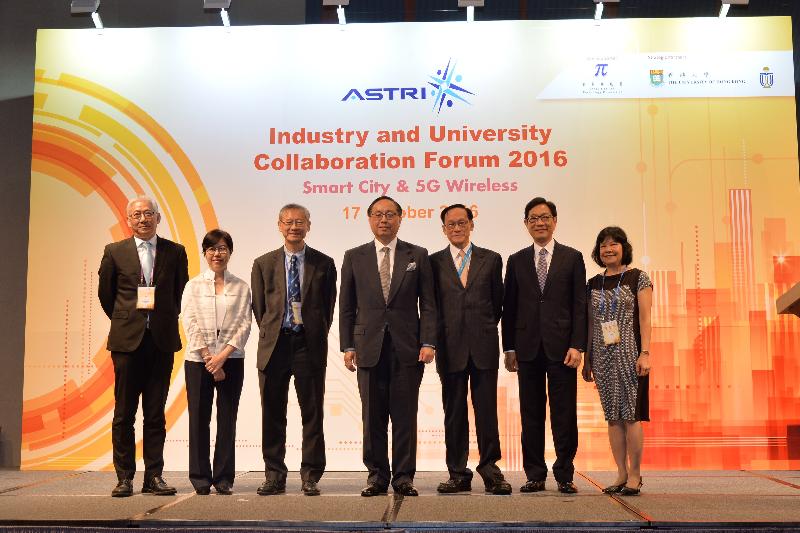Speech by S for IT at ASTRI Industry and University Collaboration Forum 2016: Smart City & 5G Wireless (English only) (with photos)
******************************************************************************************
MY (Board Chairman of ASTRI, Mr Wong Ming-yam), Professor Chen (President of Qianhai Institute for Innovative Research, Professor Edward Chen), Frank (Chief Executive Officer of the ASTRI, Dr Frank Tong), distinguished guests, ladies and gentlemen,
Good morning and welcome to Hong Kong Science Park. It is great to be back again on the occasion of the ASTRI Industry and University Collaboration Forum. We are privileged to have with us today renowned scholars and experts, business leaders and researchers in Hong Kong, and also from the Mainland and overseas to exchange views on this year's theme: Smart City and 5G Wireless.
Simply put, "smart city" is the ability for the Government and stakeholders in the city to leverage on the latest Internet technologies to improve the productivity and also the management of the entire city. The primary tool for a "smart city" is the rapid updating and dissemination of data which allow people to see things clearly and make informed decisions. "Smart city" is pursued by governments around the world with the objectives of enhancing the quality of life of its people as well as ensuring sustainable growth and competitiveness of the city.
Promoting a "smart city" is one of the priority tasks of the Innovation and Technology Bureau. In this year's Policy Address, the Chief Executive re-affirmed the Government's commitment to building Hong Kong into a "smart city". So what are our objectives? First, use innovation and technology to address urban challenges to enhance city management and improve quality of living, sustainability, efficiency and safety of our city. Second, enhance our city's attractiveness to global businesses and talent. And third, inspire city innovation and stimulate sustainable economic development.
To achieve these goals, the Innovation and Technology Bureau will work closely with the research, public and private sectors. We have just commenced in September a consultancy study to develop a "smart city" blueprint for Hong Kong up to 2030. The study will map out the digital framework, including standards, and ways to promote open data and big data initiatives. As part of the consultancy study, we will set up a portal to crowd-source innovative ideas from the community, and to share the public's views in building Hong Kong as a true "smart city".
We plan to complete the study by April next year and produce the blueprint by mid-2017. After the completion of the study, we will draw up pilot proposals in selected locations as a testbed for technology and solutions to explore the feasibility of wide use. The Innovation and Technology Bureau will also facilitate inter-bureau co-ordination and collaboration in different "smart city" initiatives.
From the resource perspective, we will continue to provide funding support for worthy projects through various support programmes under the Innovation and Technology Fund (ITF). I would encourage research institutions and private companies to make good use of the ITF funding to innovate and carry out R&D projects to develop new technologies, or to try out technologies and solutions in collaboration with government departments or public organisations or under the Public Sector Trial Scheme.
Connectivity is the cornerstone of a "smart city" and the focus of today’s forum. Hong Kong's telecommunications infrastructure is one of the most sophisticated and advanced in the world. It is an important factor contributing to Hong Kong's development as a leading business and financial centre. Just last week, Facebook and Google chose Hong Kong as the landing site for their latest and most advanced trans-Pacific submarine fiber-optic cable from North America. Locally the Government is expanding the coverage of free public Wi-Fi, enhancing the speed of Wi-Fi connection at government venues as well as its security, and opening up more public data to facilitate the development of user-friendly mobile apps for the public.
ASTRI has been making R&D efforts on advanced 4G and 5G technologies, including small cell technologies, virtualised mobile network software, and Internet-of-Things technologies for smart home. ASTRI is also planning to launch an early 5G application testbed to facilitate mobile application development in Hong Kong. Moreover, ASTRI is currently working with the Energizing Kowloon East Office to develop a scalable smart mobility project in Kowloon East, which will direct pedestrians to their destinations more quickly and smoothly, and help drivers avoid traffic jams and locate the nearest available parking space if needed.
The development of a "smart city" requires concerted efforts and close collaboration by the Government, industry, academia, research institutes and the general public. I appeal to you all to join hands with the Government and participate in transforming Hong Kong into a "smart city".
I would like to thank ASTRI for inviting me to this year's forum. I would also like to congratulate ASTRI for forging a strategic partnership with the University of Hong Kong and 21Vianet in R&D. I shall look forward to seeing the fruits of these collaborations.
Last but not least, I wish the Forum every success and all the participants fruitful sharing. For visitors from the Mainland and overseas, I wish you an enjoyable and pleasant stay in Hong Kong. Thank you very much.
Ends/Monday, October 17, 2016
Issued at HKT 12:24
Issued at HKT 12:24
NNNN




